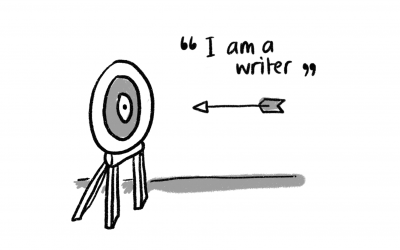You’re busy. You’ve got a job, family commitments, a life that fills your calendar from dawn until dusk. But you’ve also got dreams – a creative idea, a book you want to write – or you’ve got plans for an article you need to write, a blog to update. If your writing plans always take a back seat to more urgent and more important tasks, you need to prioritise and make writing matter.
When we ask writers what stops them writing, the most common response is a lack of time. Do you:
- long to spend time on your writing but never have the time?
- find that urgent and important tasks always get in the way of writing?
- allow the demands of others win out every time?
- find yourself procrastinating when you should be pushing forwards with your project?
If so, it’s time to put your writing first and make it matter – in short, you need to prioritise. The definition of ‘prioritise’ means to “designate or treat (something) as being very or the most important.” Prioritising helps us, according to the definition, determine the order for dealing with a series of tasks according to their relative importance. In theory, it helps you figure out what really matters in your life, and that makes it easier to find the time to do it. Here’s how to prioritise your writing.
Five approaches to prioritisation
Time management gurus have been talking about prioritisation for years – it’s nothing new. Philosophers have been debating it for millennia. Marcus Aurelius in his Meditations urges us to ask if our words and actions are one of the unnecessary things, and by corralling them, we get “not only the peace of mind of doing few things, but the greater peace of doing them well.”
In productivity circles, advice on prioritisation, takes one of two paths: one involves stopping doing things and the other involves fitting more in, optimising the time you have (there’s another gentler approach which we’ll finish on). Let’s explore.
1. Stop doing things: the four burners theory
Time is limited. If you spend hours watching YouTube videos of people falling down holes, that time has been spent. It’s gone. You can’t get it back and spend it more wisely. There is no repeat button on life.
You need to choose how you spend your time. That means stopping doing stuff that matters less.
I first came across the four burners approach when reading humourist David Sedaris in The New Yorker. In Laugh Kookaburra, he recounts a drive through the unending suburbs of Melbourne. His friend Pat asked him to picture a four-burner stove. This is a symbolic burner, she explains:
“’One burner represents your family, one is your friends, the third is your health, and the fourth is your work.’ The gist, she said, was that in order to be successful you have to cut off one of your burners. And in order to be really successful you have to cut off two.”
It’s brutal choice, but if you want to prioritise your writing which burner would you switch off? And would you dare switch off two?
>> Read more: How to make time to write – 4 approaches to finding time in busy schedules
The four burners theory has been popularised by modern-day productivity master James Clear. In his article he says:
“The Four Burners Theory reveals a truth everyone must deal with: nobody likes being told they can’t have it all, but everyone has constraints on their time and energy. Every choice has a cost.”
If the costs of stopping doing things is too high and you aren’t keen to switch off the burners that make your life happy and balanced, you need to fit it all in somehow.
“The Four Burners Theory reveals a truth everyone must deal with: nobody likes being told they can’t have it all, but everyone has constraints on their time and energy. Every choice has a cost.” James Clear
2. Do more in the time available: the parable of the jar
In time management circles, there’s a tale of an unnamed philosophy professor who asks his students how to fit a series of rocks, pebbles and sand into a jar. The jar is our life – with fixed boundaries – and the rocks, pebbles and sand are the activities that fill it.
The moral of the story is that you must prioritise the most important things in your life first. These are your rocks. Once that has been done you can fill the spaces between with pebbles and sand.
If you put the sand in first, there’s no room left for the rocks. If you first watch YouTube videos of people falling down holes then you won’t have time left to write. But you can dip into YouTube in between writing sessions – trust me, it’s the perfect 5-minute break from a 25-minute Pomodoro session.
As Stephen R. Covey writes in First Things First:
“If you were to pause and think seriously about the ‘first things’ in your life—the three or four things that matter most—what would they be?”
Only you can fill your jar, what’s important to you will be different to other people. Identify your rocks, the four things that are most important to you. These are the biggest priorities in your life – perhaps things you want to do every day, or which add up across a week. Then move to the pebbles and the sand.
“If you were to pause and think seriously about the ‘first things’ in your life—the three or four things that matter most—what would they be?” Stephen R. Covey
3. Sort the important from the urgent with the Eisenhower Matrix
Another productivity classic is the the Eisenhower Matrix. This box is a simple way to sort your tasks by priority depending on whether they are important or urgent. It comes from the quote by Dwight D. Eisenhower: “What is important is seldom urgent and what is urgent is seldom important.”
Eisenhower, the thirty-fourth President of the United States, was used to dealing with competing priorities. Whether it was planning and supervising the invasion of France and Germany in The Second World War as Supreme Commander of the Allied forces in Europe, or as President overseeing the cease-fire of the Korean War. His day to day involved juggling high stakes tasks (like what to do with nuclear weapons) and working on significant projects like the Cold War, the Space Race, US Social Security and starting the Interstate Highway System.
“What is important is seldom urgent and what is urgent is seldom important.” Dwight D. Eisenhower
Whatever tasks are on your to-do list you can benefit from sorting them into one of the following four boxes:
- Important and urgent: These are your top priority and come first. For many of us this is your boss breathing down your neck or your children needing regular meals and bedtimes.
- Important but not urgent: These are long-term goals. They’re important to your personal and professional development, but don’t have a deadline. This is where writing often sits. Your goal is to make these your next priority.
- Not important, but urgent: These activities crop up and demand time and attention and will often knock you off course with your writing. They do need to be done, so tackle them after your top priorities – or if possible delegate or re-schedule.
- Not important and not urgent: These tasks are the absolute last on your priority list. They are the things that distract you, waste your time and make you feel unproductive. Take life admin like washing up. It does need to be done, so set aside time when you are not at your most productive or get someone else to help.
>> Read more: The complete guide to writing accountability – hold yourself to account and use others to help you achieve your writing goals
4. Highlight the most important thing
You’ve switched off your unnecessary burners, sorted your pile of rocks and neatly boxed up all your important and urgent things to do. What next? You need to start.
The Most Important Task, was coined by Zen Habits master Leo Babauta as an approach to doing the things you’ve been avoiding. In short, out of your priorities find just one thing to start on first thing every day.
It builds on advice from Mark Twain:
“If it’s your job to eat a frog, it’s best to do it first thing in the morning. And If it’s your job to eat two frogs, it’s best to eat the biggest one first.” Mark Twain
>> Read more: How small steps lead to great progress
While this is sensible approach to getting things done, it’s not particularly pleasant. If you’re going to make writing a habit long term, it needs to be something enjoyable.
I much prefer Jake Knapp and John Zeratsky’s ‘Highlight’ which they wrote about in Make Time.
Your highlight might be something you need to do (write a report for work) but it can also be something you want to do (finish that short story). They explain:
“Your highlight isn’t the only thing you’ll do each day. But it will be your priority. Asking yourself: ‘What’s going to be the highlight of my day?’ ensures you spend time on the things that matter to you and you don’t lose the entire day reacting to other people’s priorities. When you choose a highlight, you put yourself in a positive, proactive frame of mind.”
Feeling positive about your writing is what will keep you going long term.
“Asking yourself: ‘What’s going to be the highlight of my day?’ ensures you spend time on the things that matter to you.” Jake Knapp and John Zeratsky
This leads us to a fifth and final approach and the ultimate in prioritisation – acceptance.
5. The Venn diagram of ‘need to’ and ‘willing to’ do
In his book Four Thousand Weeks: Time and How to Use It Oliver Burkeman explores how to build a life of creativity, productivity and meaning when we have limited time available – and even less control over that time. His overall message is one of acceptance – that acknowledging our limited time on earth allows us to leverage the possibilities and opportunities we have. Confronting our own death (the 4,000 weeks of the title) is the key to leading a fulfilling and productive life.
However, that’s not a quick exercise for you to jot down on the back of an envelope!
Burkeman does have one tip he returns to again and again. He asks us to imagine a Venn diagram consisting of two circles: “at any given moment, there’s a huge set of things that ‘need doing’, and another set of things I’m actually willing to do.”
He suggests we listen to ourselves in a spirit of friendliness, and find that somewhere those two circles overlap. He says “there’s always something constructive I’m willing to do. It doesn’t matter how small it is. The point is that constructive action is incompatible with total despair.”
>> Read more: Oliver Burkeman on time and how to use it
How to prioritise your writing
We can’t make more time, but we can accept what time is available and make better use of it for what really matters.
These exercises in prioritisation help you to reframe and redesign how you think about time to make delayable dreams more urgent and important.
To prioritise your writing, there’s no need to cut corners, make huge sacrifices or burn the candle at both ends – that just leads to is exhaustion, stress and guilt. Instead you need to find a balance between the things you must do, want to do, and love doing – the things that make your life richer and more fulfilling.




